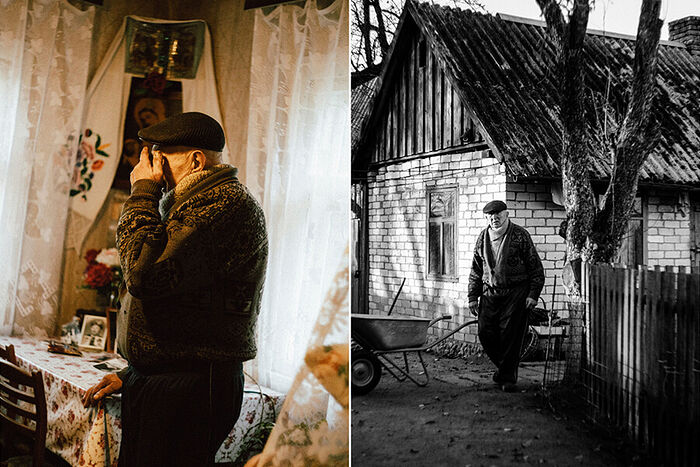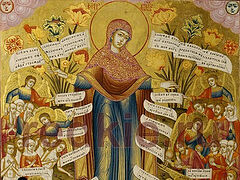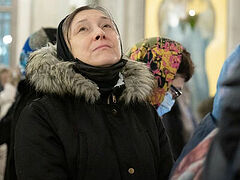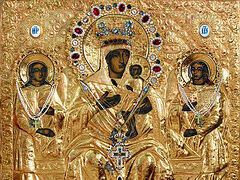Cross
The village is quiet now in November. There’s no one to be seen. In one yard, a scarecrow softly rustles; somewhere roosters crow and dogs bark. The schedule for the food truck hangs on a pole; mailboxes stand empty. It’s hard to imagine that life ever simmered here. Only a couple of people are hibernating in the village for the winter, and there are absolutely no young people.
We walk from the church along the village’s cobblestone path. Until 1939, this territory was part of Poland, and the cobblestones were laid by Poles. It turns out that these stones preserve the footprints of those 264 residents who went to be executed in 1942.
“That’s how they were led through the village to the firing pit,” says Fr. Igor. “The pit was eighty feet long. They say that when the residents were standing at the pit, they neither wept nor cried out—they prayed. They didn’t fill in the pit for a long time. Then, until the 1970s, there was a hill in its place. At some point, it was removed, and silage pits were set up nearby.”
 Memorial cross at the site of the failed execution of village residents
Memorial cross at the site of the failed execution of village residents
On the eightieth anniversary of the appearance of the Mother of God, the Kamenets Executive Committee decided to beautify the memorial place. They brought sand, gravel, and crushed stone, and they made steps and planted grass, flowers, and young trees.
“The administration did all the landscaping themselves in one day,” continues Fr. Igor. “We say the Divine Liturgy is a common work, and this also was a common work.”
There used to be a cross with a wooden fence put up by the locals. It was what was left from the dome of the church that burned in the village of Beloe, which the people of Rozhkovka bravely ran into. It was included in the composition of a new, larger cross and painted gold, thus connecting the past with the present in a single whole.
When we arrived at this place, the sun started peeking out from under the November clouds, dense and impenetrable like a babushka’s featherbed. It illuminated the large cross, and under its light, the yellow cross inside became even brighter.
Living simply
“I’ll tell you that you really feel special in Rozhkovka,” Fr. Igor admits. “It’s nice and quiet here. When I came here to serve, I felt like I’d gone thirty years into the past.
“And why is that? Because of the kind of people living here—they’re real people. They say what they think. They may be wary of you at first, but when you get to know them better, they accept you as one of their own.
“You know, sometimes it happens that babushkas fight, they get angry, and they yell at each other—but not here. They’re all calm, clean, and wholesome. There’s no gossip here, no extraneous conversations, no fuss or tension. They stick together; they worry about each other. When you’re with them, it feels like when you were with your own grandmother in childhood.
I’ve learned a lot from them: calmness, and how you can live simply. That is, I learned how to live simply. They don’t buy anything, they don’t worry about anything, and they don’t cry about not having enough money or that something’s not quite right in their life. They pray to God and thank Him. And they live a decent life.
There’s a babushka here who already has thirteen or fourteen great-grandchildren.
They live very quietly like this.
 Lydia Vladimirovna—a native of Rozhkovka
Lydia Vladimirovna—a native of Rozhkovka
Baba Lydia
We pass by a yellow country house, with a well-kempt yard, chickens walking about behind the wire fence, apples collected in a basket on the bench. A babushka comes out of the house, in a jacket, galoshes, and a headscarf. She goes to feed the chickens. This is Lydia Vladimirovna. She’s eighty years old.
“My parents told me how they were driven out to the pit. They arrived in the morning and said, “Come on, get out there and dig the pit.” They were driven out to be shot because they heard they were taking care of partisans. The men dug the pit and talked about how they were probably digging it for themselves. I was eight months old then, and my sister was three. Our mother took us to the church (that was being built), put us down there, and she and my father were driven out to the pit. That’s what they told me.”
There’s a heated stove in Lydia’s house. Potatoes are boiling on the gas stove in the kitchen. Though she’s already in her eighties she still keeps chickens and pigs. She gets up at six, heats the stove, and cooks potatoes for the pigs and chickens.
“I married a local. We built this house together. How old was I? I was still young. I finished seventh grade and then I stayed here for two years and got married. Yes. He came from the army. He liked me [laughs], so I married him. And him? Well, he was nothing special [laughs]. No, I didn’t regret it. He loved me…”
She went through seventh grade, then worked as a milkmaid all her life. Her husband died twelve years ago, and her daughter lives in the city. Lydia lives alone.
“I worked as a milkmaid from 1959 to 2002. Oh, how much I worked! And I earned a good pension, for the whole village!” she says with pride, “There’s enough of everything. But I just can’t give up the work. I can’t!”
“Is it hard to live alone?”
“Of course. But I got used to it before work, so I work—and that’s it.”
“And you don’t want to go to the city?”
“No! I wouldn’t make it. I couldn’t live in the city. I wouldn’t survive,” she says for the third time, taking clear pauses between words. “Maybe I could stay there a day or two, but that’s it. I’m just drawn to the village, and that’s it [laughs], poking around in the ground.
“A neighbor comes in the winter; she lives across the street. She comes and we sit together for a while. She’s three years older than me. In the evening, I read some kind of book; my daughter brings newspapers from Brest, and I read them. It’s not boring, no. I had a place, and my grandchildren told me to come to them. I don’t want to. When I won’t be so courageous anymore, then I suppose I’ll have to. I cook myself something to eat, I clean. What else do I need? I threw myself into work like this—maybe that’s why I’ve been lucky and have been living for such a long time.”
There’s a service at the church tomorrow—the feast of the Kazan Icon of the Mother of God. Lydia’s going to go to church.
 Gerasim Vladimirovich—a Rozhkovka native
Gerasim Vladimirovich—a Rozhkovka native
Grandpa Gerasim
There’s a yellow house not far from the church. Grandpa Gerasim is bringing the apples he collected in a wheelbarrow. He looks at us sternly, skeptically, and scrupulously asks who we are, where we’re from, and why we’re here. He checks us out, like a real partisan. When we pass his test, he invites us to sit on the bench by his house.
“Well, sit down… I’ve been around since 1935. Count how old I am.
“In 1942, early, it was still dark. The head of the village came. He said to find a couple of guys and give them shovels. They grabbed a few guys. They took them out to dig the pit. They said they already knew that they’d be shot. They took a bottle of vodka and a piece of bread. But the Germans were nearby. The men dug the pit, they drank, and then one of them said: ‘Let us give our souls to God, and we’ll show those fascists!'
“They’d already driven the cattle out of the village, to the other end. Then they said to load up all the property we had onto carts. And just as huts stand one next to the other, that’s how they had the carts.
“They stood the old women and men there. My father wasn’t there. There were maybe fifteen people who weren’t there—they were hiding. Then my father yanked me out of the crowd. There was a barn at the other end. The guys took the hay out and hid in there. Here there was the barn, here the swamp, here an alder tree, over there water, and by the water—partisans . And the Germans were walking between the tree and the barn. And then I started crying. The men covered my mouth with their hands. The Germans heard, but just waved their hands and kept going. And then the men told my father to let me go, so I wouldn’t give them away. My father took me to the corner and let me go, and I ran to my mama.
“The youth were taken to Germany then. And the children born from 1930 to 1935 were taken to the village of Dmitrovich. We had white armbands on to distinguish us. When the villagers were released, everyone went to Dmitrovich to look for their children. They didn’t find me. No one recorded us; we didn’t know our last names. We spent the night in the village of Chernaki. My father asked a bunch of people and managed to find me. That’s how it was.
“I spent my whole life here. In 1957, I built this hut and joined the army. I served in Dnepropetrovsk. As soon as I got out of the army, I got married. She’s from a village a few miles away. I would walk everywhere, but I didn’t see her. That’s how it was. Maybe she was hiding. After the army, I went to work at the school, stoking the stove. There was an election, and she came to the school. We were standing together, like I am with you now, and that was that. It was quick, yup. That meant she was mine. My fate. And so we went through life. We spent fifty-nine years together—just one year shy of sixty. That was our fate.”
Grandpa Gerasim’s daughter, who’s staying with him now, talks about how he worked on the farm and his wife was a custodian. She had a stroke and stayed in bed her last sixteen years. Grandpa Gerasim took care of her, cooking food, cleaning, and keeping up with the household. His wife died in May. He took it really hard. But taking care of the house pulled him out of his sadness and depression. He still keeps the chickens and works in the vegetable garden.
There are big old apple trees in his yard. He planted them when he had just built the house. Grandpa Gerasim gathered a big bag of apples and grapes for us for the road.
Looking at these simple people, who lived their lives honestly, purely, and worthily, you think: Maybe the main miracle of this village is in the people? In the planted apple trees, in the houses they’ve built, in the children they’ve raised, in their respect for their past, in their love for each other and for God? Maybe when you work such little miracles every day without even noticing it, God works a great miracle? Like back in 1942.













